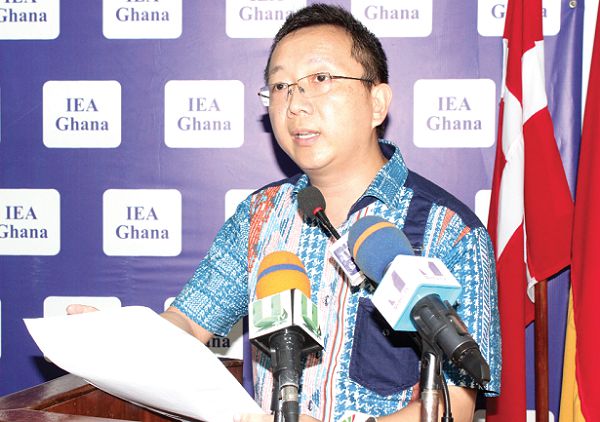
Chinese can't engage in illegal mining without local help - Chinese envoy
The Chinese Embassy in Ghana has stated that the destruction caused by the illegal mining (galamsey) activities in the country must be blamed on Ghanaians and not Chinese nationals.
"The assertion that illegal mining is caused by Chinese is a misconception because the root cause of the menace lies in Ghana, and so any solution to it also lies in Ghana.”
The Deputy Chief of Mission at the Chinese Embassy, Mr Zhu Jing, who stated this at a round-table discussion organised by the Institute of Economic Affairs (IEA) in Accra last Monday on the way forward to tackling the illegal mining menace, said no Chinese national could engage in illegal mining without local collaborators.
"Chinese illegal miners could not have come all the way from China to Ghana without the facilitation, support and shelter from local people, so Ghana is the root cause of the problem," he stressed.
Participants
Speakers at the round-table discussion including the Convener of the Media Coalition Against Galamsey, Mr Kenneth Ashigbey, a Professor at the Mining and Engineering department of the University of Mines and Technology (UMAT), Professor Sulemana Al-Hassan, had, in their presentations, accused the Chinese for fueling the menace.
Prominent personalities such as the Member of Parliament (MP) for Asutifi South and former minister of Lands and Natural Resources, Mr Collins Dauda, a former minister of state at the presidency in charge of public private partnership, Dr Rashid Pelpuo, and the Member of Parliament for Klortey Korle, Dr Zanetor Rawlings, were at the event.
The Chairman of the Minerals Commission board, Mr S.K. Boafo and the Omanhene of the Essikado Traditional Area, Nana Kobina Nketsia V, were among other dignitaries at the event.
The crux
While admitting that many Chinese had engaged in the illegality, Mr Jing stressed that it was the responsibility of Ghana to crack down on both foreign galamseyers and their local collaborators.
"Illegal mining has caused terrible destruction to water and land in Ghana and appropriate measures must be put in place to deal with it. I was posted to Ghana about four months ago and after visiting some mining sites, I was shocked by what I saw.”
"China is in a position to support any move to uproot illegal mining and we expect the government of Ghana to solve the issue according to the laws and regulations, and these must not exclude Chinese illegal miners. We support that we should punish Chinese illegal miners by using the law but we should not do so and leave out their Ghanaian collaborators," he stressed.
He added that the Chinese had already started a repatriation process of some illegal miners in a bid to maintain a good bilateral relationship with Ghana.
"The Ghana-China relation goes beyond illegal mining because China is investing in many sectors in this country including health care, education, agriculture," he said.
He observed that it was important for Ghana to create employment opportunities for local people who were being taken out of illegal mining to ensure that they did not return to it.
Way forward
Mr Ashigbey advocated that the way forward to tackling the galamsey menace required a decentralisation of the licensing regime such that chiefs and the local assemblies were put at the centre of the process.
He said the fight against illegal mining must be made part of the yardstick for measuring the performance of metropolitan, municipal and district chief executive (MMDCEs).
"I am of the view that the commitment to fight galamsey must be part of the performance of MMDCEs and the local people must be involved in the management of their own the resources; this is the way to go," he said.
He urged the government to ensure that the Multi-sectorial Mining Integrated Project (MMIP) that was developed with a road map to pick up the pieces in the mining sector was implemented to the latter.
Mr Ashigbey also called for state institutions such as the Environmental Protection Agency (EPA) and the Minerals Commission to be empowered and resourced with logistics and the right human resource to help sanitise the mining sector at the grass roots.
For his part, Prof.Sulemana stressed the need to decentralise the mining administration to make it more effective.
He said the over centralisation of the licensing regime in Ghana made the process too cumbersome.
He also said it was important to make chiefs and MMDCEs a part of managing mining activities to ensure that sanity returned to the sector.
